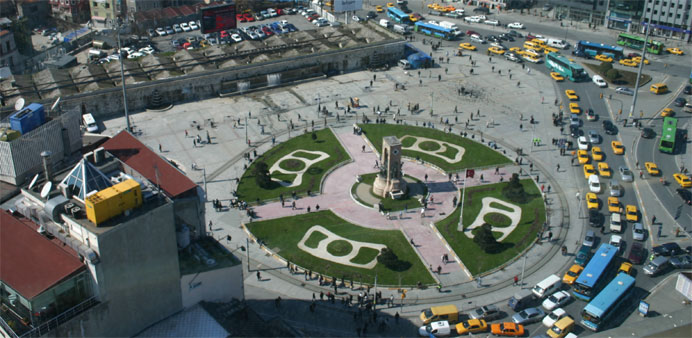AFP/Istanbul
Thousands of people are expected to defy a government ban to gather on Istanbul's highly symbolic Taksim Square today, a year after May Day clashes helped launch a nationwide protest movement.
Prime Minister Recep Tayyip Erdogan has warned protesters to "give up hopes" of meeting on Taksim, a traditional and symbolic rallying point, but activists have vowed to ignore the ban and a massive police presence, raising tensions to a fever-pitch ahead of the workers' holiday.
Violent protests between police and protesters on May Day last year were followed weeks later by protests that snowballed into one of the biggest challenges to Erdogan's rule.
Last week Erdogan said he would "not tolerate" any demonstration on the square, saying: "Give up on your hopes of Taksim. Do not engage in a fight with the state. Do not disturb the peace of our people.”
Istanbul Governor Huseyin Avni Mutlu added yesterday that intelligence reports indicated "illegal terrorist groups" were planning unrest at Taksim, making the ban necessary.
Turkish media meanwhile reported that 40,000 police officers as well as dozens of water cannon trucks and armoured vehicles would be deployed to Istanbul on May 1, with roughly half of the city's police force drafted into the centre to block access to the square.
But leftist unions and the opposition have vowed to ignore the ban.
Yesterday, the so-called May 1 Committee – made up of unions and civil society groups – said that they would "defy an irrational, unlawful ban".
"All roads will lead to Taksim on May 1," Kani Beko, the head of the DISK union, said in a statement on behalf of the committee.
As an alternative to Taksim, the government has suggested a rally area in Yenikapi, a reclaimed land overlooking the Marmara Sea where Erdogan's Islamic-rooted Justice and Development Party (AKP) held a massive rally in the run up to the March 30 local elections.
The government has also offered free transport to Yenikapi while limiting Istanbul public transport to make it more difficult to access Taksim Square.
Taksim Square was only opened to May Day rallies in 2009, ending a three-decade ban brought on by a May Day bloodbath when unknown gunmen fired on a peaceful crowd, killing 33 people.
More than 30 years after the 1977 tragedy, parliament reinstated May Day as a national holiday in 2009 and decided to fully open the square to celebrations only to ban it again last year citing renovation work in the area, sparking anger by leftists.
Just weeks after last year's May Day clashes, a relatively small movement to stop redevelopment of Istanbul's Gezi Park – adjacent to Taksim – grew into a nationwide wave of anti-Erdogan protests that killed eight people before losing momentum.
Fresh protests, though on a smaller scale, have erupted over a corruption scandal implicating key Erdogan allies and controversial measures taken by the prime minister including an Internet crackdown that saw Twitter banned for two weeks.
Erdogan's government, though victorious at local elections last month, is extremely sensitive to reigniting the fires of last year's protest movement.
"During the Gezi movement, the government saw for the first time that even opposition not backed by any political party managed to mobilise against it," said Menderes Cinar, a political scientist at the Ankara-based Baskent University. "This has both baffled and frightened Erdogan. Of course he would not want history to repeat itself."
But Cinar doubted a second wave of nationwide demonstrations could surge if clashes erupt on May 1, saying that the government would quash any street protests before they become big enough to challenge Erdogan's authority.
Despite the protests, the corruption scandal and the much-criticised measures, Erdogan's AKP scored a resounding victory in local elections, winning 45% of the vote.
Prosecutors launch probe into Gulen
Reuters/Ankara
Turkish prosecutors have launched a criminal investigation into US-based Islamic cleric Fethullah Gulen based on allegations he attempted to overthrow the government, broadcaster CNN Turk and other media reports said yesterday.
Prime Minister Recep Tayyip Erdogan said on Tuesday that he would ask the United States to extradite former ally Gulen, whom he accuses of plotting to topple him and undermine Turkey with concocted graft accusations and secret wire taps.
A move to extradite Gulen, whose followers say they number in the millions, would be possible only if Turkey first issued an arrest warrant and produced evidence of a crime, according to one legal expert.
Erdogan, whose ruling AK Party traces its roots to political Islam, accuses him of building a "parallel state" of followers in institutions such as the police and judiciary and using them in an attempt to seize the levers of state power.
Culture Minister Omer Celik told broadcaster NTV there was an investigation into Gulen based on "serious allegations, a process extending as far as spying activities".
NTV reported separately, without specifying its sources, that the investigation, launched by state prosecutors in the capital Ankara, was also based on accusations against Gulen of "establishing and leading a gang", NTV reported.
Officials at the prosecutor's office declined to comment on the reports regarding Gulen, who has lived in self-imposed exile in Pennsylvania since 1999, when secularist authorities raised accusations of Islamist activity.

